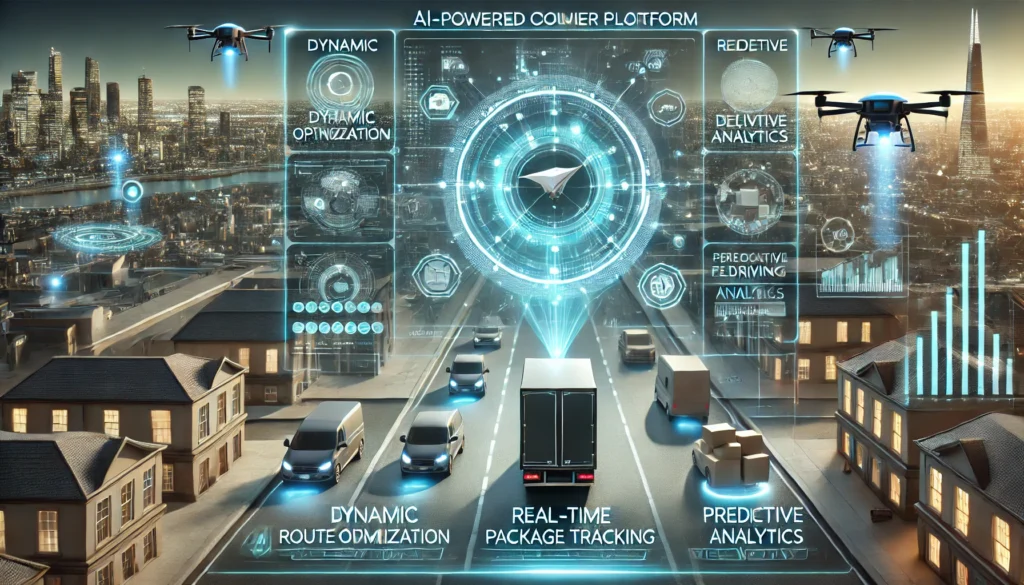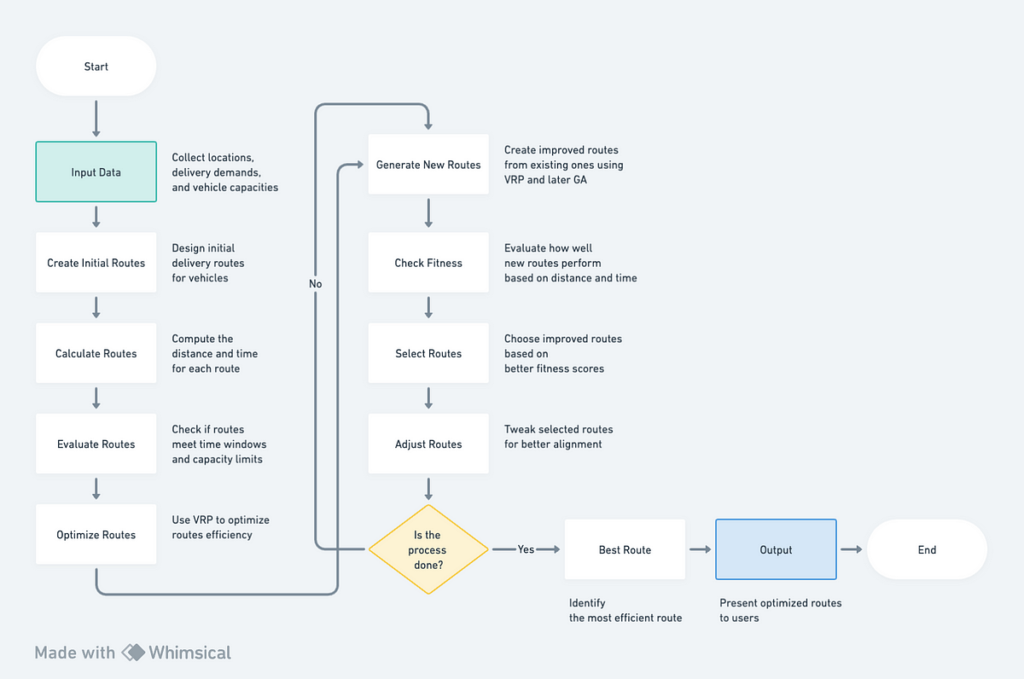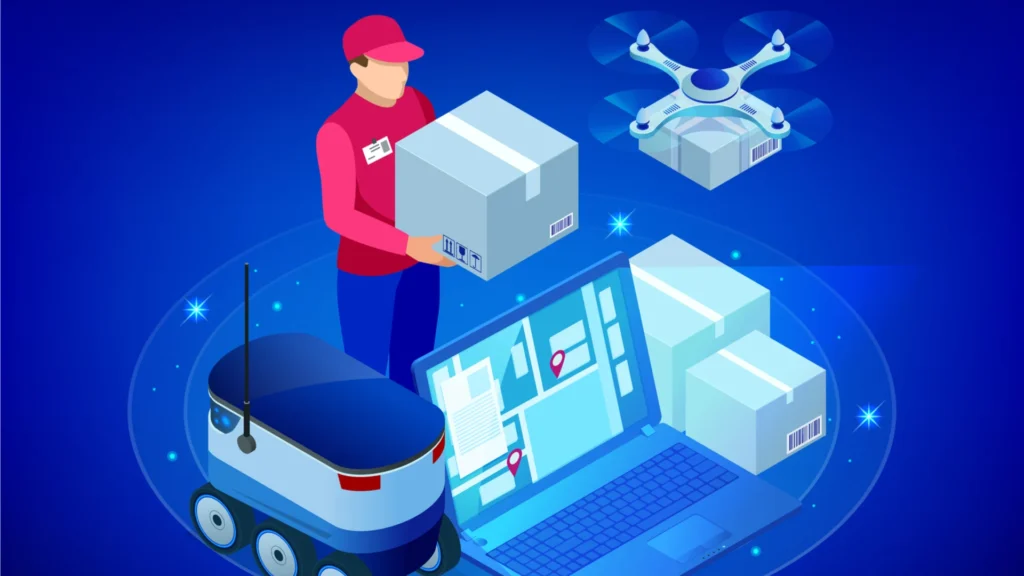AI-Powered Courier Platforms: Revolutionizing the Delivery Industry
The logistics and courier sector is adopting state-of-the-art technologies in the era of digital transformation in order to streamline operations, minimize expenses, and improve client experiences. Artificial intelligence (AI) has become a game-changer among these developments, providing solutions that enhance decision-making, expedite procedures, and satisfy the expanding needs of on-demand delivery and e-commerce. Real-time package transportation from Point A to Point B is being redefined by AI-powered courier platforms, which are no longer a sci-fi idea.
The main characteristics, advantages, and difficulties of AI-powered courier platforms or smart delivery systems are examined in this blog, along with their revolutionary effects on the logistics industry.
Table of Contents

The Role of AI in Courier Platforms
The ability of artificial intelligence (AI) to analyze vast amounts of data, spot trends, and reach conclusions faster and more accurately than humans makes it special. With the help of these tools, courier services may streamline every facet of delivery, including load management, route planning, client communications, tracking, and even predictive analytics.
Core Functions of AI in Courier Platforms:
- Dynamic Route Optimization
AI algorithms calculate the most efficient routes for delivery by analyzing traffic patterns, weather conditions, and real-time road updates. This reduces delivery times and fuel consumption, lowering operational costs and carbon footprints. - Demand Forecasting
AI models use past data, seasonal patterns, and outside variables to forecast delivery demand. Businesses can scale operations during busy periods and utilize resources more efficiently. - Smart Parcel Sorting
Machine learning (ML) systems enhance sorting operations in warehouses, ensuring packages are organized and dispatched quickly without manual errors. - Real-Time Tracking and Visibility
AI-powered systems provide or AI-powered courier platforms end-to-end visibility of shipments, allowing customers and businesses to track parcels in real time. This increases transparency and builds trust. - Customer Interaction and Support
Customer issues about delivery status, delays, or return procedures are easily handled by chatbots and AI assistants, which provide prompt answers.
Key Benefits of AI-Powered Courier Platforms
- Improved Efficiency and Cost Savings
AI lowers the time and expenses related to manual interventions by automating repetitive processes and streamlining operations. By itself, dynamic route optimization can reduce transportation expenses for courier services by up to 30%. - Enhanced Customer Experience
Real-time tracking, accurate delivery timelines, and proactive communication elevate customer satisfaction. Features like delivery rescheduling or address adjustments further personalize the experience. - Sustainability
AI-driven route optimization minimizes unnecessary travel, reducing fuel consumption and emissions. Sustainability has become a priority for businesses and consumers alike, and AI-powered platforms support greener operations. - Scalability
AI systems can handle vast amounts of data, making them ideal for scaling operations during periods of high demand, such as holidays or sales events. - Error Reduction
From accurate parcel sorting to minimizing delivery delays, AI reduces human errors, improving overall reliability and service quality. - Fraud Detection
Platforms for couriers with AI capabilities can spot data irregularities, assisting businesses in spotting and stopping fraudulent activity such as fabricated claims for misplaced shipments or illegal access to delivery networks.

Examples of AI in Action
- Amazon’s Delivery Network
Amazon uses AI-powered courier platforms extensively in its delivery operations. Machine learning powers its dynamic routing and drone delivery systems, ensuring packages reach customers swiftly and efficiently. - DHL’s Predictive Analytics
DHL leverages AI for demand forecasting and predictive maintenance of its delivery fleet, reducing downtime and improving overall efficiency. - Uber Freight and Postmates
These platforms use AI to match deliveries with the nearest available drivers, balancing supply and demand in real-time for faster and more cost-effective services. - FedEx SenseAware
FedEx has incorporated AI into its SenseAware technology, offering customers real-time updates on package location and condition, including temperature and humidity monitoring.
Challenges in Implementing AI-Powered Courier Platforms
While the advantages are clear, integrating AI into courier operations comes with its own set of challenges:
- High Initial Investment
Developing and deploying AI-powered systems requires significant financial resources. Small and midsized courier companies may struggle to afford these technologies. - Data Privacy Concerns
Handling sensitive customer and logistics data requires robust security measures to prevent breaches and ensure compliance with data protection regulations. - System Integration
Legacy systems in traditional courier companies may not be compatible with modern AI solutions, requiring costly upgrades or replacements. - Skill Gaps
Implementing and maintaining AI systems demand skilled personnel, including data scientists and AI specialists, which may not be readily available. - Dependence on Data Quality
The effectiveness of AI depends on the quality and volume of data. Inaccurate or incomplete data can lead to suboptimal decision-making and operational inefficiencies.

Future Trends in AI-Powered Courier Platforms
The rapid advancements in AI and its applications in logistics indicate that the future of courier platforms will be even more transformative. Here are some trends to watch:
- Autonomous Delivery Vehicles
Self-driving delivery trucks and drones are set to revolutionize the last-mile delivery process, significantly reducing costs and delivery times. - Predictive Maintenance
AI systems will monitor vehicle performance in real time, predicting and preventing breakdowns before they occur. - Hyper-Personalized Deliveries
Advanced AI will offer customers hyper-personalized delivery options based on their preferences, such as specific delivery times or secure drop-off points. - Blockchain Integration
Combining AI with blockchain will enhance transparency and security in supply chains, ensuring tamper-proof records of delivery operations. - Green Logistics
AI will play a pivotal role in achieving sustainability goals, enabling carbon-neutral or even carbon-negative delivery practices.
How Businesses Can Prepare for the AI Revolution
To harness the benefits of AI-powered courier platforms, businesses must take proactive steps:
- Make an investment in data infrastructure.
- Create reliable systems to efficiently gather, store, and analyze data.
- Work Together with Technology Providers
- Collaborate with AI solution suppliers to have access to state-of-the-art technology without having to start from scratch.
- Upskill workers to collaborate with AI systems, guaranteeing a smooth transition between machine intelligence and human knowledge.
- Before expanding to whole operations, start small by implementing AI in particular domains, such as customer service or route optimization.
- Pay Attention to Compliance
- Make sure AI applications follow industry standards and data protection legislation.
Conclusion
AI-powered courier platforms represent the next frontier in logistics, offering unparalleled efficiency, accuracy, and customer satisfaction. By addressing current challenges and embracing emerging trends, courier companies can stay ahead of the competition and meet the evolving demands of the modern marketplace.
As the technology advances, it has the potential to completely transform the delivery sector and usher in a day where packages travel more quickly, sustainably, and intelligently than ever before. This AI-driven development promises to transform logistics from a service to a seamless experience for both customers and enterprises.
